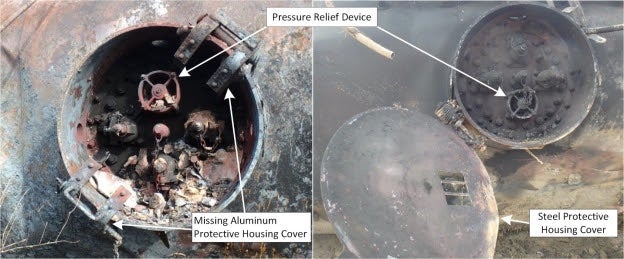The National Transportation Safety Board “is looking closely” at how aluminum protective housing covers on three tank cars carrying vinyl chloride performed after the Feb. 3 derailment of a Norfolk Southern train near East Palestine, Ohio.
Eleven tank cars carrying hazardous materials derailed, including five carrying vinyl chloride. On Feb. 6, NS conducted a controlled release of the cars carrying vinyl chloride to prevent them from exploding due to chemical reactions occurring inside the tank cars.
In a Thursday update, NTSB noted that it “is concerned that aluminum protective housing covers on some of the tank cars may have melted or were consumed when pressure relief devices vented burning gas while functioning as designed to release tank pressure.”
The agency says melted aluminum may have dripped into some of the pressure relief devices (PRDs), “possibly degrading their performance.”
“When a tank car is exposed to fire conditions and its contents are heated, the pressure inside the tank rises. This can lead to loss of tank shell strength and eventually a breach,” NTSB said. “To protect emergency responders and the public from the possibility of catastrophic tank failure under fire conditions, the pressure inside tank cars must be controlled. PRDs are intended to regulate internal pressure by releasing small quantities of material and reclosing after normal conditions are restored. This reduces the probability of a breach in the tank shell and limits the amount of energy a breach can release if one occurs. Properly functioning PRDs thus reduce the potential for catastrophic tank failure.”

NTSB is focusing on aluminum protective housing covers used on three of the vinyl chloride tank cars. The aluminum protective housing covers were manufactured in the 1990s.
The agency will be looking for industry data to determine how many of these tank cars are in service.
The tank cars were DOT-105J300W tank cars.
Further testing will be conducted on the PRDs and the valve assemblies from the five vinyl chloride tank cars.
NTSB reiterated that it could issue urgent recommendations at any point during the investigation if warranted.

EPA orders Norfolk Southern to test for dioxins in East Palestine
Meanwhile, the Environmental Protection Agency has ordered NS (NYSE: NSC) to test the area near the derailment for dioxins.
The tests are in response to concerns voiced by East Palestine residents.
EPA will order an immediate cleanup of the area if the level of dioxins is unacceptable for human health and the environment, the agency said Thursday. EPA is also requiring NS to conduct a background study to compare dioxin levels around East Palestine with levels in areas not impacted by the derailment. This is because dioxins can also be found in urban and rural environments as a result of common activities such as burning wood and coal, EPA said.
The agency said it would continue its sampling for “indicator chemicals” as well. Test results to date suggest a low probability of the release of dioxin from the derailment.
The agency is reviewing a draft plan developed by NS that would develop a dioxin “fingerprint” for soil sampling, so that scientists and EPA will be able to determine whether any dioxin from the derailment or the controlled release impacted the local environment, EPA said.
Subscribe to FreightWaves’ e-newsletters and get the latest insights on freight right in your inbox.
Click here for more FreightWaves articles by Joanna Marsh.










